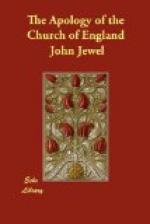Moses, a civil magistrate, and chief guide of the people, both received from God, and delivered to the people, all the order for religion and sacrifices, and gave Aaron the bishop a vehement and sore rebuke for making the golden calf, and for suffering the corruption of religion. Joshua also, though he were none other than a civil magistrate, yet as soon as he was chosen by God, and set as a ruler over the people, he received commandments specially touching religion and the service of God. King David, when the whole religion was altogether brought out of frame by wicked king Saul, brought home again the Ark of God; that is to say, he restored religion again; and was not only amongst them himself as a counsellor and furtherer of the work, but he appointed also hymns and psalms, put in order the companies, and was the only doer in setting forth that whole solemn show, and in effect ruled the priests. King Solomon built unto the Lord the Temple which his father David had but purposed in his mind to do: and after the finishing thereof, he made a goodly oration to the people concerning religion and the service of God: he afterward displaced Abiathar the priest, and set Sadok in his place. After this, when the Temple of God was in shameful wise polluted through the naughtiness and negligence of the priests, King Hezekiah commanded the same to be cleansed from the rubble and filth, the priests to light up candles, to burn incense, and to do their Divine service according to the old and allowed custom; the same king also commanded the brazen serpent, which then the people wickedly worshipped, to be taken, down and beaten to powder. King Jehoshaphat overthrew and utterly made away the hill altars and groves; whereby he saw God’s honour hindered and the people holden back with a private superstition from the ordinary Temple, which was at Jerusalem, whereto they should by order have resorted yearly from every part of the realm. King Josiah with great diligence put the priests and bishops in mind of their duties; King Joash bridled the riot and arrogancy of the priests; Jehu put to death the wicked prophets.
And to rehearse no more examples out of the old law, let us rather consider, since the birth of Christ, how the Church hath been governed in the Gospel’s time. The Christian emperors in the old time appointed the councils of the bishops. Constantine called the council at Nice; Theodosius the First called the council at Constantinople; Theodosius the Second, the council at Ephesus; Martian, the council at Chalcedon; and when Ruffine the heretic had alleged for authority a council which, as he thought, should make for him, St. Hierom his adversary, to confute him, “Tell us,” quod he, “what emperor commanded that council to be called.” The same St. Hierom again, in his epitaph upon Paula, maketh mention of the emperor’s letters which gave commandment to call the “bishops of Italy and Greece to Rome to a council.” Continually for the space of five hundred years, the emperor alone appointed the ecclesiastical assemblies, and called the councils of the bishops together.




